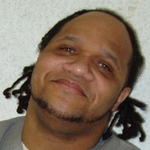
Executions in Oklahoma and Alabama, scheduled just hours apart on September 26, highlight issues of proportional sentencing and experimental methods of execution. Emmanuel Littlejohn, who was executed at 10:17am CT, had received a recommendation of clemency from Oklahoma’s Pardon and Parole Board because of conflicting evidence about whether he or a co-defendant actually killed the victim. Alan Miller, scheduled to be executed in the evening of September 26, survived a botched lethal injection execution in 2022 and would be the second person in U.S. history killed by nitrogen hypoxia.
Mr. Littlejohn (pictured) was the fourth person executed in Oklahoma in 2024. He was convicted and sentenced to death for his involvement in the robbery and murder of a convenience store clerk in 1992, but there is doubt about who pulled the trigger. During a 1993 trial, prosecutors argued that Mr. Littlejohn’s codefendant, Glenn Bethany, was responsible for killing Kenneth Meers, and he was sentenced to life in prison without the possibility of parole. In Mr. Littlejohn’s 1994 trial, prosecutors argued the opposite, insisting that Mr. Littlejohn was the shooter, not Mr. Bethany. The jury, which was unaware of the sentence handed down to Mr. Bethany a year earlier, sentenced Mr. Littlejohn to death, which was later overturned on appeal because of improper testimony from a jailhouse witness. He was resentenced to death in 2000.
During Mr. Littlejohn’s clemency hearing, Assistant Federal Public Defender Callie Heller questioned “is it justice for a man to be executed for an act that prosecutors argued another man committed when evidence of guilt is inconclusive?” At the hearing, Mr. Littlejohn admitted to his presence at the crime scene, but insisted he did not kill Mr. Meers. His clemency petition highlights several ways in which his death sentence is the “opposite of reliable” and indicated that Mr. Littlejohn “poses no threat to the prison community” because of his good behavior, connection to his family, and “debilitating health issues” from a “recent stroke and diagnosis of progressive white matter disease.” The clemency petition states that if “given the chance to live out his remaining years in prison, Manuel will continue to provide familial support, model good behavior, and live with remorse.”
Without issuing a public statement, Governor Kevin Stitt denied clemency for Mr. Littlejohn just minutes ahead of his execution. In a phone conversation with NPR’s Chiara Eisner, ahead of his clemency denial, Mr. Littlejohn urged Gov. Stitt to not “kill [him] for the heck of it.” He told Ms. Eisner that he was scared. “I have never been so scared in my life. To have somebody have your life in their hands and you can’t do nothing about it, it messes with a person. It messes with them and you are going to take it up to the last second, but I will respect your decision either way,” Mr. Littlejohn said. He added, “I want to live and I don’t believe I deserve to die for this.”
The state of Alabama is scheduled to execute Alan Miller by nitrogen hypoxia — just the second time the state will attempt this method of execution. In September 2022, Alabama attempted to execute Mr. Miller by lethal injection, but failed to do so when personnel could not establish IV lines for the lethal drugs. This execution attempt was one of three botched executions in Alabama that year. Mr. Miller was convicted in 2000 for a workplace shooting that left three individuals dead. At trial, Mr. Miller’s defense presented a forensic psychiatrist who diagnosed him with a delusional disorder, which caused him to believe that the victims were spreading rumors about him. Despite this diagnosis, the forensic psychiatrist determined that Mr. Miller’s mental illness did not meet Alabama’s standards for an insanity defense. Jurors took just 20 minutes for deliberation and voted in favor of Mr. Miller receiving a death sentence.
Following his failed lethal injection execution, Mr. Miller and the state of Alabama reached an agreement that any other execution attempt would be by nitrogen hypoxia. In a federal lawsuit, Mr. Miller claimed that the state’s current nitrogen hypoxia could cause him undue harm and suffering, violating the Eighth Amendment protection against cruel and unusual punishment. Parties reached a confidential agreement, but Attorney General Steve Marshall touted that this resolution proves the soundness of the method. “The resolution of this case confirms that Alabama’s nitrogen hypoxia system is reliable and humane,” Mr. Marshall said in a statement.
If Mr. Miller is executed, he will be the 1600th person executed in the United States since the resumption of capital punishment in 1976.
Kim Chandler, Alabama to carry out the second nitrogen gas execution in the US, Associated Press, September 26, 2024; Nolan Clay, Oklahoma death row inmate Emmanuel Littlejohn executed, The Oklahoman, September 26, 2024; Michelle Del Rey, A parole board recommended clemency for Emmanuel Littlejohn. Oklahoma executed him anyway, The Independent, September 26, 2024; Chiara Eisner, ‘Governor, don’t kill me for the heck of it’: Oklahoma prisoners asks for clemency, NPR, September 26, 2024; Michelle Watson, Alabama is set to execute its second inmate by nitrogen gas, a relatively new method of capital punishment, CNN, September 26, 2024; Sean Murphy, Oklahoma parole board recommend governor spare the life of man on death row, Associated Press, August 7, 2024.
Clemency
Nov 27, 2024


